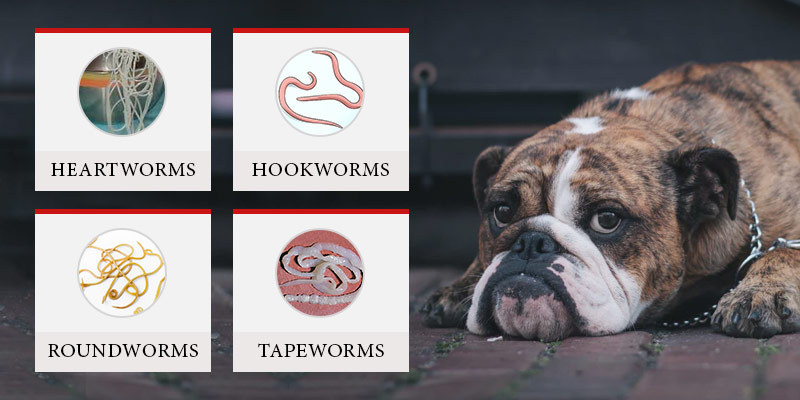The Various Types of Intestinal Worms in Dogs

For years, intestinal worms have been a highly common problem that has affected a huge chunk of canines. While treating them has been fairly simple, they can be very fatal if left unnoticed or detected very late. There are many types of intestinal worms that can possibly affect our furry buddy, and it is imperative for us dog parents to know about them. Also, we will be mentioning the ways one can treat each of them.
Types of Worms in Dogs and Treatment Ways
There are about five major worms that can affect our dogs. They are – heartworms, hookworms, roundworms, tapeworms, and whipworms. Let’s now delve deep and get to know more about these blood-sucking critters that cause havoc to our furry munchkins.
Heartworms
Definition: Heartworm is a serious life-threatening disease that is caused by a blood-borne parasite called Dirofilaria Immitis. These worms live and breed in an around the heart and lung areas causing excessive pain and discomforts. Adult heartworms tend to reside for up to five years, and during this time the female worm produces tons and tons of microfilaria (offspring). Heartworms can lead to health conditions such as heart failure, lung cancer, and other organ failures.
Symptoms: The following symptoms can be a sign of heartworms in dogs.
- Persistent and mild cough
- Reduction in weight
- Appetite loss
- Lethargy
- Fatigued after moderate activity
Treatment: Products such as Heartgard Plus, Advantage Multi, Valuheart, Nuheart, Comfortis Plus, RSPCA Monthly Heartworm tablets, Nexgard Spectra, Revolution, etc are effective.
Hookworms
Definition: Hookworms are parasitic nematodes that colonize the skin as well as the digestive tract of dogs. These short, blood-sucking critters generally tend to enter through the mouth or skin and feed by clinging onto the walls of the small intestine. While such a disease can affect large quantities of dogs, puppies are at a higher risk of getting infected with hookworms.
Symptoms: The symptoms of hookworms include the following.
- Anemia
- Dark and tarry stool
- Body weakness
- Lethargy
- Increase in appetite
- Loss in weight
Treatment: AntezoleLiquid Suspension, Antezole Paste, Cazitel, Cestem Tablets, Drontal Plus, Mediworm Plus, Milbemax, Popantel, Veloxa, Panacur Granules and Oral Paste, etc are effective treatments for hookworms.
Roundworms
Definition: Also known as ascarids, roundworms are of mainly two types (in dogs) – Toxocara canis and Toxascaris leonine. During their adult stage, they reside in the small intestines, while in their larval stage they generally live and breed near the lungs and other organs. Generally, dogs come in contact with roundworms when they ingest roundworm eggs from the feces or the soil. They then hatch within the walls of the body, causing damages to the intestinal walls as well as disruptions to the digestive system.
Symptoms: Roundworms can exhibit various symptoms. They are as follows:
- Diarrhea
- Coughing
- Vomiting
- Swellings
- Lethargy
- Weight loss
- Worms in stool
Treatment: Roundworms can be treated with the use of products such as Endogard, Milbemax, Granofen, Popantel, Panacur, Cazitel Plus, Antezole Liquid Suspension, Cestem tablets, Antezole Paste, Veloxa, etc.
Tapeworms
Definition: Long, flat and white parasites which are transmitted through fleas, lice, and rodents are known as tapeworms. When these pesky creatures find themselves inside the body, they tend to bury their heads within the lining of the small intestines and in the process absorb a little portion of nutrients that flow. Tapeworms, unlike other intestinal worms, are not very harmful, but they do tend to weaken the dog’s body, which is why eliminating them quickly is essential.
Symptoms: The symptoms that can perhaps lead to tapeworms in dogs are mentioned below.
- Scooting
- Continuous licking and biting the anal areas
- Restlessness
- Dull fur coat
- Vomiting
- Yellowish segments in the feces
- Bouts of gas
Treatment: Some of the products that help in curing tapeworms are Droncit tapewormer, Cazitel tablets, Cestem tablets, Drontal Plus, Mediworm Plus, Triworm-D Dewormer, Milbemax, etc.
Whipworms
Definition: Whipworms are tiny threadlike critters that are arguably the least common of all the worms. These creatures enter a dog’s body after coming in contact with the soil that is polluted with fecal matter and worm larvae. Whipworms weaken the immune system and reduce a dog’s ability to absorb nutrients. Once the whipworm larvae mature, they slide down towards the digestive tract and into the large intestine where they feed on the numerous secretions.
Symptoms: The numerous symptoms that can be seen in dogs are given below.
- Loss in weight
- Periodic vomiting
- Body swellings
- Abdomen and body pain
- Appetite increase
- Soften and bloody stools
Treatment: Whipworms can whipped away by using products such as Cazitel, Cestem tablets, Drontal Plus, Endogard, Mediworm Plus, Triworm-D Dewormer, Popantel, Panacur Granules, Veloxa, etc.
Worms in dogs are generally not very harmful, but this does not mean we sit back and wait for something to happen to our furry buddy. Early detection to any problem is pivotal, and thus if you suspect your buddy may have the worms, we recommended you to trust your instincts and contact your local vet as soon as possible.

David joined CanadaVetCare in 2013 as a product analyst and veterinary assistant. Being a passionate pet lover and keen animal health researcher, David had always found ways and solutions to help pet parents to improve their pets’ health. He is always happy to answer pet health-related queries and recommending pet parents for the right pet product for their furry companions.

